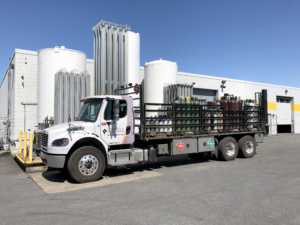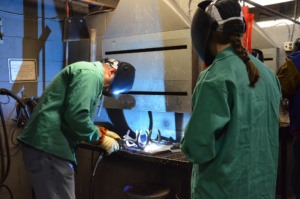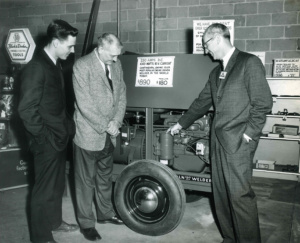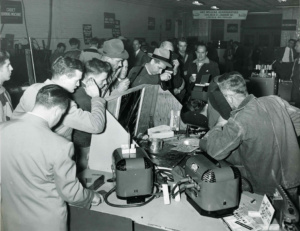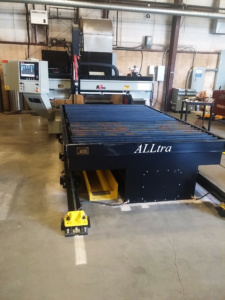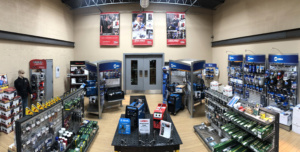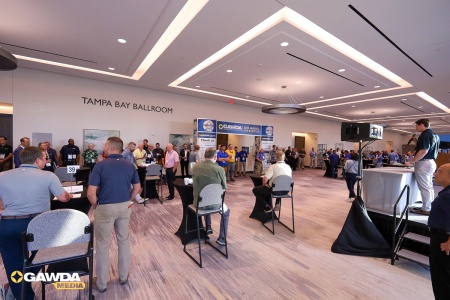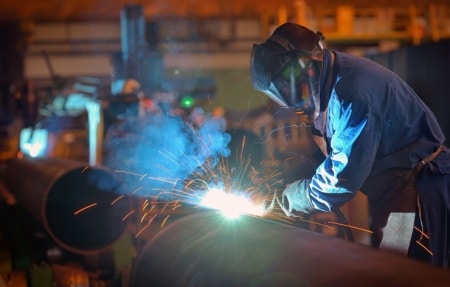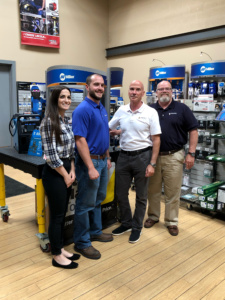
Al Earlbeck had a passion for the technical side of welding and it began when he was just a teen working for the T.A. Canty Company, in Baltimore, Maryland. Mr. Canty established a welding equipment and repair shop in 1919. By the time he was ready to retire, Al was a seasoned employee. He and a partner bought the company in 1949 and, after purchasing his partner’s shares in 1954, it became Earlbeck Welding Supplies. Today, Jim Earlbeck, Al’s son, serves as president of Earlbeck Gases &Technologies. In the 100 years since T.A. Canty was started, the company, since rebranded, has grown into a successful, regional, family-owned welding and gases distributorship with four locations and 45 employees.
Getting Technical
Al’s doctrine, which is framed in the front office of the company’s headquarters in Baltimore, was: “I believe that a distributor should know more about his products than his customers do, and has a responsibility to recommend what is honestly best for his customers to use.” This continues to define Earlbeck Gases
& Technologies today.
When Al took charge of the business, he kept the initial product offerings of welding repair, and continued to build up the technical path that the company is still on today. Allison Earlbeck, COO and third-generation family member, says, “My Grandfather loved the technical side of welding and believed in working on solutions that made his customers more efficient. Helping people understand metallurgy is rooted in our DNA.”
From the start, Al’s preference for hardgoods over gas products was well known. He is remembered as saying, “If you go into gas distribution you are nothing more than a glorified truck driver.”
Today, that attitude toward gas distribution at the company has changed dramatically. Now, the Earlbecks view the gases side of the industry as a core part of their business and one of the most promising paths forward for future growth.
Sharing Knowledge
In the 1950s, Al’s enthusiasm for welding led him to offer seminars, where he would demonstrate welding techniques and host talks on the different properties of welds. These sessions were the seeds of what was to become one of the most comprehensive and well-respected welding training programs in the industry today.
Training operations at the company were formalized in 1960, when two booths were set up to teach customers how to operate equipment and to conduct certification tests. The Earlbecks noted that people were having difficulty getting certified and developed a training program to help. By 1965, the company was administering welding certification tests for customers.
“Certification led to the comprehensive training programs that we offer today,” Allison explained. Training operations expanded to five booths in 1988 and the Earlbeck Technical Center began offering welding career courses. Jim Earlbeck was president at this time and, like his father, had a passion for educating the customer. “We were selling more advanced equipment,” says Jim. “The kind our typical customer was not familiar with. They needed a lot more assistance and we provided that by ramping up our training programs.”
Earlbeck Gases & Technologies became an American Welding Society (AWS) accredited test facility (ATF) in 2009 — one of only 80 in the nation at the time (174 today). For Earlbeck, training programs have been an effective way to combat the hardgoods margin drain that has resulted from the commodization of equipment. A class on welding basics is included with an equipment purchase at no cost to the customer. “Its value-added the customer can see,” says Allison. Other classes are fee-based and today training is a stand-alone profit center for the company.
Training has enabled Earlbeck to help its customers in many ways. When the Bethlehem Steel factory, RG Steel, in Sparrows Point, Maryland, one of the company’s earliest customers, closed its doors in 2013, some of the displaced workers were trained by Earlbeck for welding positions. This enabled them to embark on a new career path in a steady industry.
Training has also become a leading sales tool for the company. Recently, the company began offering less formalized classes for hobbyists and to attract new customers. Its first Welding Basics class, a one-day Saturday workshop for people interested in learning how to weld, sold out immediately. The workshop was so successful that the company now offers it once a month.
The symbiotic nature of training enriches the company in many ways. Says Allison, “It helps with sales, as customers appreciate that we can train them on their equipment purchases. It helps our large clients find good welders as we can point them toward our top students. And it helps build our customer base as Earlbeck students move into companies where they advocate for our products and services.”
From a modest, two-booth test site, Earlbeck has grown its training program to include a 4,500 sq. ft. dedicated welding lab with 21 welding booths at its Baltimore location, an 8 booth lab in its York location, and an additional 8 booths in a mobile training facility contained in a 40-foot trailer. In 2017, the company was awarded the AWS and WEMCO Excellence in Welding Award for the Educational Facility Category. And in 2018, Earlbeck formed a partnership with Johnson College to provide a curriculum for their 20 booth welders training program. To date, the company has tested more than 33,000 welders and averages about 1,800 tests a year.
Site Changes
In 1966, Earlbeck moved to its current headquarters at 8204 Pulaski Highway, in Baltimore. Operating in the company’s original location was becoming expensive and the new site, just outside the city limits, was more convenient for deliveries, better situated to highways and had space for growth.
Earlbeck became a stocking distributor for Burdette Oxygen in 1980, making its first step into the gases side of the business. Initially, the company was just a location for pick up and exchange of gas cylinders. Jim quickly realized the importance of gas supply to the effective selling of welding and cutting equipment and began to develop that side of the business in earnest.
In 1998, Earlbeck opened a new showroom location in Beltsville, Maryland, to serve the Washington D.C. market.
“We had been in that market with BEL Welding Supply (the E stands for Earlbeck),” says Jim. “When BEL was sold, it left that area without a technical supplier and created an opening for us.”
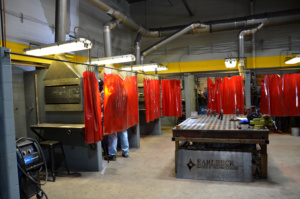
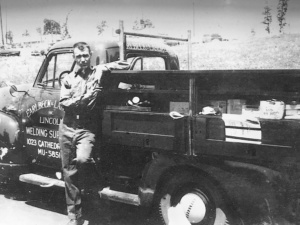
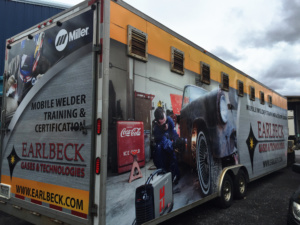
Paradigm Shift
By 2002, Earlbeck was fully invested in welder testing and training and becoming more active in gas distribution. To better reflect its expanded capabilities, the company was rebranded as Earlbeck Gases & Technologies.
Earlbeck installed a gas fill plant in 2006, enabling the company to fill compressed gases in-house. This added a significant new products platform and led to growth. “Gas distribution required new cost accounting techniques, people to run and maintain the plant, and a shift in our sales personnel,” said Allison, “We are still adding staff today in order to grow this side of the business.”
Prior to the fill plant being opened, Earlbeck’s gases business represented 10% of total revenues. Today, that slice of the business is more like 35%.
Recently, Earlbeck engineers designed and built a spec gas panel for in-house gas analysis. The company is also installing an additional fill panel and raised platform flooring to accommodate its growing gases business. While its original plant is still meeting customer demands, Allison anticipates future expansion.
The Importance of Services
Services have always been an important part of the Earlbeck business model. Company services include engineering consultation and failure analysis. When welds break, customers bring Earlbeck the pieces, and in-house experts can determine what went wrong. Other services include efficiency audits, welding procedure and welder qualification testing, and repair. The company stands behind and can repair anything it sells.
Earlbeck’s technical support staff includes 3 degreed welding engineers, 5 AWS-certified welding inspectors, 4 certified AWS welding educators, and 1 senior certified welding inspector (SCWI). In addition, all its customer service reps, counter salespeople and drivers attend in-house welding classes.
More Growth
Earlbeck Gases & Technologies has experienced double-digit growth for the past six years. This has been achieved both organically and through acquisitions. For example, when an independent distributor in York, Pennsylvania, sold to a major gas company, Earlbeck saw an opportunity and built a facility there, adding a showroom and a significant training component.
Earlbeck’s technical strength and training program were further enriched with the acquisition of Cristiano Welding supply in Scranton, Pennsylvania, in 2017. Like the York facility, this added both showroom space and training capabilities to the business.
“Cristiano was an independent welding and hardgoods distributor with a lot of technical expertise and their niche was helping customers find the right products and become more efficient,” says Allison. “They had the same objectives we do.”
Johnson College was one of Cristiano’s customers and it had a welding program. Earlbeck developed a relationship with the college and today provides the welding curriculum to Johnson, which has 20 booths.
Leadership
Jim Earlbeck became president of the company in 1981. Like his father, Jim has a passion for the technical side of the business and a degree in engineering to support it. For his business education, he was “home schooled,” working on the Earlbeck shop floor beginning in his teens.
Jim’s sister, Trudy Hammett, also joined the company at the same time and focused on accounting, human resources and IT during her career. She was the company controller until her retirement in 2017. She remains a principal to the company in an advisory capacity. “We’re still trying to fill her shoes,” says Allison.
Recognizing that succession needs to be phased in over time, Earlbeck gets advice and support from Vistage, a peer advisory group that provides small business coaching for leaders. Today, third-generation Allison Earlbeck is on board as COO. She explained, “As a family-owned company we are focused on a smooth transition in our leadership. We spend time on training and ensuring that we have the proper procedures in place.”
Currently, Joe Vincent, VP of sales, and Andrew Hess, VP of Engineering and VP of Cristiano Branch, are part of the company’s next generation leadership team.
Meeting Today’s Distributor Challenges
Jim Earlbeck writes and speaks extensively on current challenges in the hardgoods supply chain and its effects on margins. One way his company is addressing those issues is through an expansion of product offerings. “We have just brought in Fronius as a new power source line,” says Jim. “This is something we haven’t done in 25 years, but felt was necessary to offset the declining margins in other hardgoods lines.”
Earlbeck is Fronius’ exclusive supplier in their geography. While territory assignments were once the norm, no other equipment provider currently offers this to Earlbeck. As part of the Fronius agreement, Earlbeck commits to certain training and service requirements, having a sales force knowledgeable of Fronius products and specific sales goals.
Another way Earlbeck has found to tap into today’s market is through an active and information rich blog. Recognizing that people involved in purchasing roles — even in the gases and welding industry — are increasingly starting with an internet search, the company invests in its website. “Our blog is proactive marketing,” Allison explained. “We want to make sure we are at the top of a Google search. Providing a lot of content on the technical side of the business not only provides valuable educational material to the public, it enables us to become the recognized and reliable source of information on welding and related products and services.”
Earlbeck has even been able to broaden its customer base for specific services due to the Internet’s wide reach. Many people find the Earlbeck website while looking for information on welder training and certification. Earlbeck now offers welder certification testing through its website, where people can order a Send-In Test Kit, which includes test coupons, related materials, and directions. The welding coupon is welded per the guide sheet and sent back to Earlbeck, which tests to ensure it meets the requirements for that particular welding code.
The Earlbeck website also has made people aware that the company offers welding productivity audits as a service. “In our auditing process, we make sure everything, from raw material to end product, is being done as effectively as possible,” says Allison. “This has served as a great way to get our foot in the door and pick up new business.”
Moving Forward
Earlbeck is continually looking at new areas for expansion. “You’re growing or you’re going out of business,” Allison says. “Staying the same size is not an option for Earlbeck Gases & Technologies.”
The increasing use of automation is one area the company had identified for growth. Earlbeck provides turnkey solutions for robotics and CNC machinery, including installation and technicians who can fix problems. The company sees automation as an important part of future business.
As an independent, the company believes it is in the best position to continue to service the small and mid-sized customer that makes up its base. To gain more ground, Earlbeck will continue to focus on growing its gases business and further strengthening its welding training and certification services.
“Though time has changed many aspects of our business, and expanded our offerings, the core of our business remains the same,” says Allison. “We believe in providing solutions, not products, so that we become an extension of our customer’s business. This philosophy will continue to guide us for years to come, as we transition to our next generation of leadership. We are committed to remaining an independent family owned business so that we can best serve our customers and employees.”
Agnes H. Baker is a freelance writer and editor with 20 years of experience covering the industrial, medical and specialty gas industry. Based in Massachusetts, she is at: [email protected].
